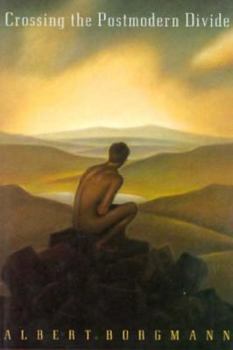Crossing the Postmodern Divide
Select Format
Select Condition 
Book Overview
In this eloquent guide to the meanings of the postmodern era, Albert Borgmann charts the options before us as we seek alternatives to the joyless and artificial culture of consumption. Borgmann connects the fundamental ideas driving his understanding of society's ills to every sphere of contemporary social life, and goes beyond the language of postmodern discourse to offer a powerfully articulated vision of what this new era, at its best, has in store...
Format:Paperback
Language:English
ISBN:0226066274
ISBN13:9780226066271
Release Date:June 1993
Publisher:University of Chicago Press
Length:182 Pages
Weight:0.64 lbs.
Dimensions:0.6" x 5.9" x 9.1"
Customer Reviews
2 ratings
Mindful and Engaging
Published by Thriftbooks.com User , 18 years ago
Borgmanns's work contains not only thoughtful analysis, but striking critique and a powerful vision of how to bring meaning back into our lives. Borgmann traces the rise of modernity back to the work of Bacon, Descartes, and Locke; continuing by examining the course of the modern age and its' eventual end. He gives us a startling look at the extent to which our culture is one of sullenness and hyperactivity. Borgmann ties in his analysis with the idea of "the promise of technology" from his earlier work Technology and the Character of Contemporary Life. The promise of technology is deeply tied to liberal democracy and while originally it was a relief to be saved from many of the burdens of life now people seek to be alleviated from or compensated for every burden. It is for this reason the Borgmann suggests that "we are in danger of loosing our sense of reality." Borgmann continues with an economic examination of modernity and what he sees as its' decline. He gives us an outline to the postmodern economy which is forming with the end of the modern era: "information processing in place of aggressive realism, flexible specialization instead of methodical universalism, and informed cooperation rather than rugged individualism." It is in Borgmann's chapter on moral decisions and material culture that we see his plan for a life of interaction and community as opposed to the vacuous modern life of individualism and universalism. From his history of the rise and fall of modernity to the sullenness and hyperactivity of our culture, Borgmann provides vivid and mindful insights into prevailing attitudes. Examining the failure of individualism and modernism, he presents alternatives to the joyless and artificial culture in which we are trapped by proposing a life of "bodily engagement, communal celebration, and focal orientation." Borgmann's work is not only philosophically engaging but powerful on an individual level which can touch us all.
Mind-Boggling Intellectual Tour De Force!
Published by Thriftbooks.com User , 23 years ago
This is a fascinatingly interesting, endlessly provocative, and eminently worthwhile read penned by a thoughtful philosopher who seems to have one foot in the heavens and the other planted firmly in every-day life. Borgmann serves up a busman's tour of history, ranging from observations on icons such as Bacon, Descartes, and Locke, yet at the same time coldly,cautiously, and carefully illustrating how we have lost so much more than we have gained in our earnest struggle to free ourselves from tradition and its hold on us, as we have increasingly become the mindlessly individualistic souls so boldly detached from any meaningful connection to one another that we have now become both socially and spiritually bereft, strangers in a strange land indeed. Borgmann's view of contemporary society offers us nothing that others have not written even more eloquently about elsewhere; his gift to us is rather to illustrate with uncommon verve and precision exactly how the our dance in the history of ideas as well as our enthusiastic embrace of materialism has acted to gradually bankrupt us in terms of having any real meaningful sense of who we really are and why it is we are alive. According to the author, we are now living in circumstances so far estranged from any kind of natural connection to or relationship with the environment that we seem to believe that whatever artificially created surroundings we may have are mere furniture, incidental and unconnected to us or how we experience our lives, and therefore we cannot understand the ways in which this "mere furniture" fatefully influences and determines our own possibilities, both in terms of our material well being, and for Borgmann, at least, also in terms of our waning recognition of the possibility of any substantial spiritual existence. This is indeed a rather breath-taking vision, one that both encapsulates prior history, and also places that history in context as the meaningful prologue to what now exists. We have confidently left behind any belief in meaningful central authority, are ardently enthusiastic believers in the unalloyed superiority of the rational mode of thought, and are bravely rational progressives in the sense we take mere "material progress" to be the greatest possible good. Now at long last we awake from five centuries of striving to be free to find ourselves locked into a wide-open world of someone else's design, suddenly left in the lap of material luxury to try to cope with forces we neither understand nor fully appreciate in terms of their magnitude or consequence. Instead, we tune into the shallow commonweal of the media, where all things are hyped, and where nothing is scared, other than the stock market and the supposed spread of individual wealth. Is it any wonder we have collectively lost faith in the power of the present to satisfy us, or become suspicious that the future holds little but more of the same vacuous fare? As another reviewer states, it seems the more






